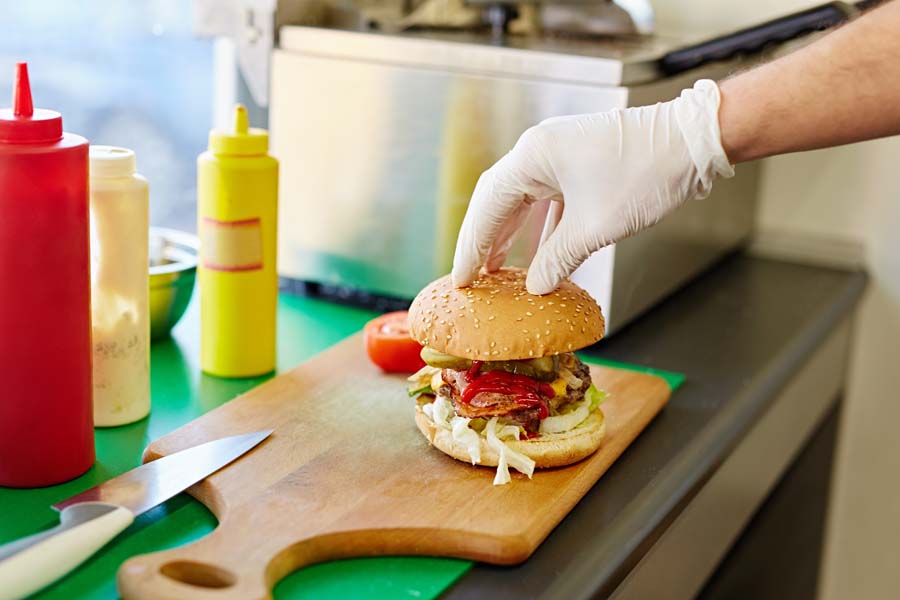Easy Steps to Get Your servsafe food handler certificate Without Difficulty
Easy Steps to Get Your servsafe food handler certificate Without Difficulty
Blog Article
Increase Your Work Opportunities: Why a Food Trainer Certification Is a Must-Have in the Culinary Industry
In today's competitive culinary landscape, the importance of a food handler certification can not be overemphasized. This credential not just shows a person's devotion to keeping food safety and security criteria yet additionally functions as a vital possession in improving employability within the market. As restaurants and food service establishments progressively prioritize certified staff, professionals geared up with this accreditation stand to acquire a substantial benefit. Nevertheless, the ramifications of this accreditation extend beyond plain employability; they can additionally affect wage prospective and profession progression. Exploring these facets exposes a deeper understanding of why this qualification is a critical investment for culinary specialists.
Relevance of Food Security
In the cooking sector, the importance of food security can not be overstated. Polluted food can lead to severe wellness concerns, consisting of foodborne illnesses, which can affect individuals and lead to significant liability for food establishments.
Food safety encompasses a series of procedures, including proper food handling, storage, cooking, and serving techniques. Sticking to these techniques not just decreases the threat of contamination yet additionally assists in abiding by regional health and wellness guidelines. Appropriate training in food safety allows culinary professionals to identify possible dangers and carry out safety nets efficiently.
Additionally, a strong commitment to food safety can enhance the credibility of a cooking facility, cultivating consumer commitment and service growth. Consumers are increasingly familiar with food safety and security problems, making it important for food trainers to demonstrate their adherence to best methods. Ultimately, focusing on food safety is not just a regulatory need; it is a basic element of giving high quality food solution and shielding the wellness of customers.

Certification Demands
Food safety practices are just as effective as the people applying them, making qualification an important action for food handlers in the cooking sector. To obtain a Food Handler Certification, prospects should commonly complete a training program that covers vital subjects such as foodborne illnesses, sanitation, personal hygiene, and risk-free food taking care of techniques.
Many accreditation programs are made to suit various learning styles, providing choices for online, in-person, or hybrid styles. Individuals need to pass an assessment to show their understanding of the product, with a minimal passing rating usually evaluated 70%.
The period of training can differ, with some programs calling for just a couple of hours, while others might cross a number of days. After effectively completing the program and exam, candidates receive their certification, which is generally legitimate for 3 to 5 years, depending upon regional policies.
Renewal frequently involves taking back the training course or finishing a refresher program to guarantee that food handlers remain upgraded on the most recent techniques and requirements. Compliance with these certification requirements not just improves private understanding but also adds to the general security and quality of food solution procedures.
Task Market Demand
How has the work market for food handlers evolved over the last few years? The need for food handlers has significantly increased, mostly driven by the expanding understanding of food safety and security and health among customers and regulative bodies. With the rise of foodborne ailments, dining establishments, catering solutions, and food production firms are prioritizing the hiring of qualified food handlers to make certain compliance with wellness policies. This change has caused a heightened emphasis on food safety and security training and accreditation as requirements for employment in the cooking sector.
Additionally, the increasing restaurant industry, especially with the development of food delivery solutions and food trucks, has actually developed an abundance of task possibilities for food trainers. The need for experienced employees who can securely prepare and deal with food has actually come to be critical. servsafe food handler certificate. Additionally, as culinary services take on much more rigorous safety methods, the value of a food trainer certificate has actually risen, making it an important property for task seekers
Because of this, people entering the culinary workforce are discovering that acquiring a food trainer certification not just enhances their employability however likewise places them favorably in a competitive task market that progressively focuses on food safety and health standards.
Advantages of Accreditation
Obtaining a food handler certificate provides many advantages that dramatically enhance an expert's standing in the cooking market. It demonstrates a dedication to food security and hygiene, which is critical in avoiding foodborne ailments. servsafe food handler certificate. This accreditation equips individuals with necessary expertise regarding secure food managing methods, consisting of correct storage space, cooking temperature levels, and hygiene procedures
Additionally, having a food trainer certification can improve an individual's employability. Numerous employers prioritize prospects with this certification, watching it as a sign of professionalism and trust and proficiency. This can result in far better job chances and potentially higher wages, as certified individuals are commonly entrusted with greater responsibilities.
Additionally, the accreditation promotes a culture of safety and accountability within the workplace. It not only boosts a staff member's self-confidence in their abilities however likewise promotes a safer environment for customers and coworkers alike. Last but not least, keeping a food trainer certification can open up doors to more instructional and job innovation possibilities within the cooking area. Overall, this qualification is a tactical investment that benefits both specialists and the establishments they serve, eventually adding to a successful culinary sector.
Steps to Obtain Certified
Getting a food handler certificate entails a straightforward procedure that can establish individuals on a course to enhanced occupation prospects in the culinary sector. The first step is try this website to locate a certified program or training provider that uses food safety programs. Lots of Click Here organizations offer both in-person and on-line alternatives, enabling for adaptability in knowing.

After efficiently passing the examination, people will get their food trainer certificate, which is commonly valid for a certain period, typically 3 to 5 years. To maintain qualification, it may be essential to complete refresher course training courses or retake the exam before the expiration date.
Lastly, it is necessary to verify any kind of local or state-specific laws concerning food handler accreditation, as demands can vary. By complying with these actions, people can get their qualification and considerably enhance their employability in the competitive culinary landscape.

Verdict
Finally, getting a food handler certificate is critical in the culinary market, as it makes certain adherence to food safety requirements and boosts employability. With the growing demand for licensed employees, this credential not just opens doors to task possibilities yet also contributes to occupation innovation and increased making capacity. additional reading Inevitably, a food trainer certification signifies a commitment to security and professionalism and trust, cultivating a society of accountability that benefits both employees and employers in the food service sector.
Report this page